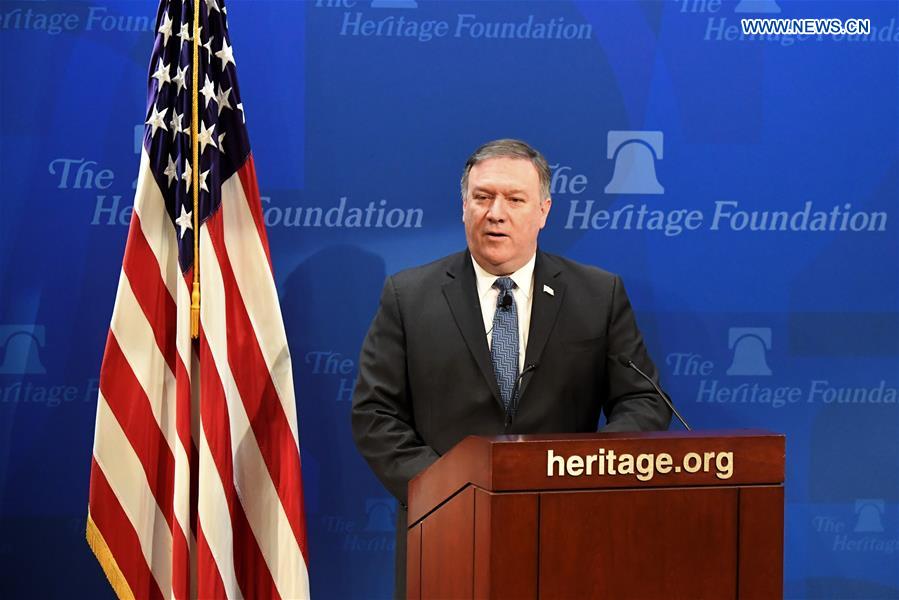
U.S. Secretary of State Mike Pompeo delivers a speech regarding U.S. policy after withdrawing from Iran nuclear deal at the Heritage Foundation in Washington D.C., the United States, on May 21, 2018. Mike Pompeo on Monday chastised Iran for its nuke and missile programs, vowing to issue Tehran the toughest sanctions in history if it does not change course. (Xinhua/Yang Chenglin)
WASHINGTON, May 21 (Xinhua) -- U.S. Secretary of State Mike Pompeo on Monday chastised Iran for its nuke and missile programs, vowing to issue Tehran the toughest sanctions in history if it does not change course.
In a speech at the Heritage Foundation, a U.S.-based conservative think tank, the U.S. top diplomat rolled out a "new Iran strategy," issuing tough rhetoric against Tehran and summoning calls for frustrated U.S. allies.
Defending the U.S. withdrawal from the historic Iran nuke deal, Pompeo said Iran must report to the International Atomic Energy Agency about its nuclear program, end the proliferation of its missiles, and stop supporting "terrorist groups" in the Middle East.
"We will ensure freedom of navigation on the waters in the region. We will track down Iranian operatives and their Hezbollah proxies operating around the world and crush them," said Pompeo. "Iran will never again have carte blanche to dominate the Middle East."
Speaking of the U.S. upcoming sanctions, Pompeo said "these will be the strongest sanctions in history by the time we are done."
"The sting of sanctions will only grow more painful if the regime does not change course from the unacceptable and unproductive path it has chosen," he said. "We will also ensure Iran has no possible path to a nuclear weapon -- ever."
Pompeo said that the United States wanted a better deal to address its concerns on Iran.
"Any new deal must begin with defining what the world should demand from Iran," he said. "America did not create this need for changed behavior, Iran did."
Outlining the bid to establish an international coalition to pressure Iran, Pompeo said "we want support of our most important allies and partners in the region and around the globe."
"We welcome any nation which is sick and tired" of Iran's behavior, he noted, adding that the United States will send teams around the globe to explain the U.S. motives and build a global momentum.
The speech came after the Trump administration withdrew from the historic Iran nuke deal earlier this month despite the global outcry.
While announcing the pullout, U.S. President Donald Trump vowed to impose "the highest level" of economic sanctions on Tehran and inflict punishments like secondary sanctions on nations that have business links with Tehran.
U.S. Treasury Secretary Steven Mnuchin also said in an announcement that "sanctions will be reimposed subject to certain 90-day and 180-day wind-down periods. At the conclusion of the wind-down periods, the applicable sanctions will come into full effect. This includes actions under both our primary and secondary sanctions authorities."
The United States' European allies, which have many economic links with Tehran, have been particularly frustrated.
French Finance Minister Bruno Le Maire responded that Europe should not accept the United States' playing the role of the "world's economic police," or become U.S. "vassals" that "obey decisions taken by the United States while clinging to the hem of their trousers."
German Chancellor Angela Merkel also said on May 11 that the U.S. exit decision "breaks the trust in the international order."
Although the deal was far from ideal and many issues still remain unresolved, the U.S. withdrawal is a cause of great concern and regret, she said.
The European Commission on Friday proposed the activation of a dormant statute to shield European firms doing business with Iran due to the renewed U.S. sanctions.
After the exit announcement by Trump, Chinese Foreign Ministry spokesperson Geng Shuang said that China regrets the U.S. decision.
Geng said China urged all parties to proceed "in the long-term and overall situation in a responsible manner, persist in solving and managing differences through political and diplomatic means, and return as soon as possible to the correct track of continuing to implement the comprehensive agreement."
"A bigger, better deal is a pipe dream," said Robert Einhorn, a former State Department official and non-proliferation expert, at an event of the Brookings Institution.
He noted that Washington's "real objective is not really a bigger, better, deal, the real objective is to put immense pressure on Iran" to weaken the Iranian government.
However, Einhorn predicted that "new sanctions won't be as crippling as those put in place in 2012," partly because other countries "strongly oppose" Trump's decision to abrogate the deal.
"Other countries will defy or ignore sanctions, and look for workarounds," Einhorn said.















